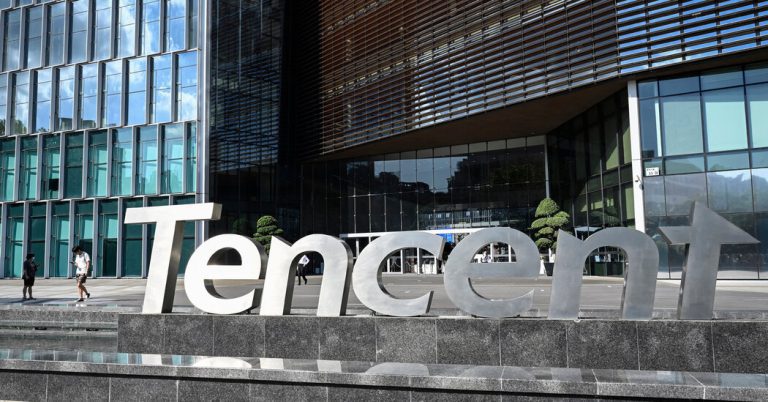The Pentagon on Monday designated Tencent, the Chinese social media and gaming giant, as a Chinese military enterprise operating in the United States, the latest in an escalating series of retaliations between the world’s two superpowers.
Shares of Tencent in the United States fell nearly 10 percent after the Defense Department decision, which also targeted Chinese battery, drone and shipping companies.
The Ministry of Defense annually updates a list of what it defines as “Chinese military companies,” entities it has identified as possessing both military and commercial technology. There are now 134 companies on the list, which was published in the Federal Register. It also added Modern Amperex Technology Company, known as CATL, as well as China Overseas Shipping, known as COSCO. chipmaker Changxin Memory Technologies; and drone maker Autel Robotics. China Overseas Shipping is China’s largest shipping company and one of the largest in the world.
Tencent’s listing was “apparently a mistake,” a company spokeswoman said in an emailed statement. “We are not a military company or supplier.”
Tencent also said the listing would have “no impact on our business” and that it would “cooperate with the Ministry of Defense to address any misunderstanding.”
The designation is a warning to businesses in the United States that working with companies on the list could disqualify them from future contracts with the Pentagon.
To be added to the list, a company must have certain business activities within the United States. For example, CATL is licensing its battery technology to US automaker Ford Motor, which is building a $3.5 billion electric vehicle plant in Michigan.
A spokesman for CATL said the company had “never been involved in any military operation or activity,” adding that the designation “does not restrict CATL from conducting business with entities outside the Department of Defense and is not expected to have a material adverse effect on our business ». CATL planned to challenge the blacklisting and said it could consider legal action.
Other companies added to the list did not immediately respond to requests for comment.
As tensions between the United States and China have escalated in recent years, pressure is mounting on lawmakers to find ways to block China’s technological and military advances.
In 2021, Chinese consumer electronics company Xiaomi successfully sued the Pentagon to be removed from the blacklist after arguing in federal court that it had no ties to the Chinese military.
More recently, the countries have been engaged in an escalating economic confrontation. It began during the first term of President-elect Donald J. Trump after targeting China with tariffs and trade restrictions. At the time, Beijing received mostly symbolic and measured responses in retaliation.
Since then, the Biden administration has expanded its restrictions on Chinese companies and imposed bans on dual-use products, recently targeting 140 Chinese companies. On Thursday, the administration said it was considering a new rule that could limit or ban Chinese drones in the United States.
Beijing has adopted an increasingly aggressive stance as it prepares for a second presidential term with Mr. Trump, an outspoken critic of China and its economic power.
Chinese regulators have announced an investigation into US computer chip company Nvidia, banned the export of rare minerals to the United States and made more targeted attacks on individual companies to expose their supply chain vulnerabilities.
Janet L. Yellen, the Treasury secretary, and her Chinese counterpart, He Lifeng, held a virtual meeting on Monday, the latest in a series aimed at advancing discussions between the countries’ economic policymakers. According to a report by the Ministry of Finance, both sides expressed concerns about rising economic tensions. Ms. Yellen warned that Chinese policies affecting American companies and workers will continue to have a damaging impact on the United States-China relationship, according to the reading.
Mr. expressed concerns about Washington’s economic and trade restrictions on China, Chinese state media reported.




